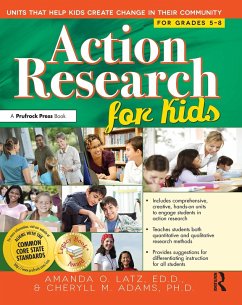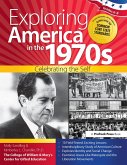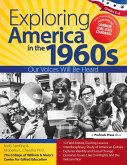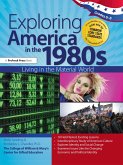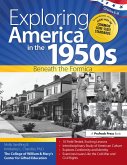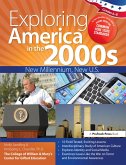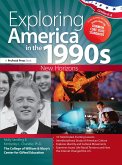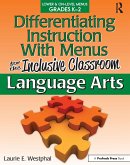Amanda O. Latz, Cheryll Adams
Action Research for Kids (eBook, ePUB)
Units That Help Kids Create Change in Their Community (Grades 5-8)
25,95 €
25,95 €
inkl. MwSt.
Sofort per Download lieferbar

13 °P sammeln
25,95 €
Als Download kaufen

25,95 €
inkl. MwSt.
Sofort per Download lieferbar

13 °P sammeln
Jetzt verschenken
Alle Infos zum eBook verschenken
25,95 €
inkl. MwSt.
Sofort per Download lieferbar
Alle Infos zum eBook verschenken

13 °P sammeln
Amanda O. Latz, Cheryll Adams
Action Research for Kids (eBook, ePUB)
Units That Help Kids Create Change in Their Community (Grades 5-8)
- Format: ePub
- Merkliste
- Auf die Merkliste
- Bewerten Bewerten
- Teilen
- Produkt teilen
- Produkterinnerung
- Produkterinnerung

Bitte loggen Sie sich zunächst in Ihr Kundenkonto ein oder registrieren Sie sich bei
bücher.de, um das eBook-Abo tolino select nutzen zu können.
Hier können Sie sich einloggen
Hier können Sie sich einloggen
Sie sind bereits eingeloggt. Klicken Sie auf 2. tolino select Abo, um fortzufahren.

Bitte loggen Sie sich zunächst in Ihr Kundenkonto ein oder registrieren Sie sich bei bücher.de, um das eBook-Abo tolino select nutzen zu können.
Action Research for Kids provides teachers with comprehensive, creative, and hands-on units to engage students in action research.
- Geräte: eReader
- mit Kopierschutz
- eBook Hilfe
Andere Kunden interessierten sich auch für
![Exploring America in the 1970s (eBook, ePUB) Exploring America in the 1970s (eBook, ePUB)]() Molly SandlingExploring America in the 1970s (eBook, ePUB)33,95 €
Molly SandlingExploring America in the 1970s (eBook, ePUB)33,95 €![Exploring America in the 1960s (eBook, ePUB) Exploring America in the 1960s (eBook, ePUB)]() Molly SandlingExploring America in the 1960s (eBook, ePUB)31,95 €
Molly SandlingExploring America in the 1960s (eBook, ePUB)31,95 €![Exploring America in the 1980s (eBook, ePUB) Exploring America in the 1980s (eBook, ePUB)]() Molly SandlingExploring America in the 1980s (eBook, ePUB)33,95 €
Molly SandlingExploring America in the 1980s (eBook, ePUB)33,95 €![Exploring America in the 1950s (eBook, ePUB) Exploring America in the 1950s (eBook, ePUB)]() Molly SandlingExploring America in the 1950s (eBook, ePUB)33,95 €
Molly SandlingExploring America in the 1950s (eBook, ePUB)33,95 €![Exploring America in the 2000s (eBook, ePUB) Exploring America in the 2000s (eBook, ePUB)]() Molly SandlingExploring America in the 2000s (eBook, ePUB)33,95 €
Molly SandlingExploring America in the 2000s (eBook, ePUB)33,95 €![Exploring America in the 1990s (eBook, ePUB) Exploring America in the 1990s (eBook, ePUB)]() Molly SandlingExploring America in the 1990s (eBook, ePUB)33,95 €
Molly SandlingExploring America in the 1990s (eBook, ePUB)33,95 €![Differentiating Instruction With Menus for the Inclusive Classroom (eBook, ePUB) Differentiating Instruction With Menus for the Inclusive Classroom (eBook, ePUB)]() Laurie E. WestphalDifferentiating Instruction With Menus for the Inclusive Classroom (eBook, ePUB)16,95 €
Laurie E. WestphalDifferentiating Instruction With Menus for the Inclusive Classroom (eBook, ePUB)16,95 €-
-
-
Action Research for Kids provides teachers with comprehensive, creative, and hands-on units to engage students in action research.
Dieser Download kann aus rechtlichen Gründen nur mit Rechnungsadresse in A, B, BG, CY, CZ, D, DK, EW, E, FIN, F, GR, HR, H, IRL, I, LT, L, LR, M, NL, PL, P, R, S, SLO, SK ausgeliefert werden.
Produktdetails
- Produktdetails
- Verlag: Taylor & Francis eBooks
- Seitenzahl: 248
- Erscheinungstermin: 3. September 2021
- Englisch
- ISBN-13: 9781000492590
- Artikelnr.: 62526216
- Verlag: Taylor & Francis eBooks
- Seitenzahl: 248
- Erscheinungstermin: 3. September 2021
- Englisch
- ISBN-13: 9781000492590
- Artikelnr.: 62526216
- Herstellerkennzeichnung Die Herstellerinformationen sind derzeit nicht verfügbar.
Dr. Amanda O. Latz is an Assistant Professor of Adult, Higher, and Community Education in the department of Educational Studies at Ball State University where she teaches a variety of graduate-level courses. She holds a BS in sociology with a minor in human resource development from James Madison University (2001), an MA in higher education administration from Appalachian State University (2006), and an Ed.D. in Adult, Higher, and Community Education (2011) as well as a Certificate in College and University Teaching (2009) from Ball State University. Her dissertation, titled Understanding the Educational Lives of Community college Students through Photovoice, was funded in part by the Myra Sadker Dissertation Award. Her research interests reside in the following areas: the lived experiences of individuals involved within the community college setting, particularly students and faculty; qualitative research methods; the scholarship of teaching and learning, especially innovative pedagogies; college and university faculty development; collegiate athletics; gender, social class, popular culture and education; and gifted education. She has presented her research and theoretical papers at a number of national and international conferences. In addition, her work has appeared in a variety of peer-reviewed journals such as Transformative Dialogues: Teaching and Learning Journal, Journal for the Study of Sports & Athletes in Education, Journal for the Education of the Gifted, and Academic Exchange Quarterly.
Cheryll M. Adams is director of the Center for Gifted Studies and Talent Development at Ball State University. She teaches graduate courses for the license in gifted education. For the past 25 years, she has served in the field of gifted education as a teacher of gifted students at all grade levels, Director of Academic Life at the Indiana Academy for Science, Mathematics, and Humanities, and as the principal teacher in the Ball State Institute for the Gifted in Mathematics program. Additionally, she has been the founder and director of various other programs for gifted students. Dr. Adams has authored or coauthored numerous publications in professional journals, as well as several book chapters. She serves on the editorial review board for Roeper Review, Gifted Child Quarterly, Journal for the Education of the Gifted, and The Teacher Educator. She has served on the Board of Directors of the National Association for Gifted Children, has been president of the Indiana Association for the Gifted, and currently serves on the board of The Association for the Gifted, Council for Exceptional Children. In 2002, she received the NAGC Early Leader Award.
Cheryll M. Adams is director of the Center for Gifted Studies and Talent Development at Ball State University. She teaches graduate courses for the license in gifted education. For the past 25 years, she has served in the field of gifted education as a teacher of gifted students at all grade levels, Director of Academic Life at the Indiana Academy for Science, Mathematics, and Humanities, and as the principal teacher in the Ball State Institute for the Gifted in Mathematics program. Additionally, she has been the founder and director of various other programs for gifted students. Dr. Adams has authored or coauthored numerous publications in professional journals, as well as several book chapters. She serves on the editorial review board for Roeper Review, Gifted Child Quarterly, Journal for the Education of the Gifted, and The Teacher Educator. She has served on the Board of Directors of the National Association for Gifted Children, has been president of the Indiana Association for the Gifted, and currently serves on the board of The Association for the Gifted, Council for Exceptional Children. In 2002, she received the NAGC Early Leader Award.
